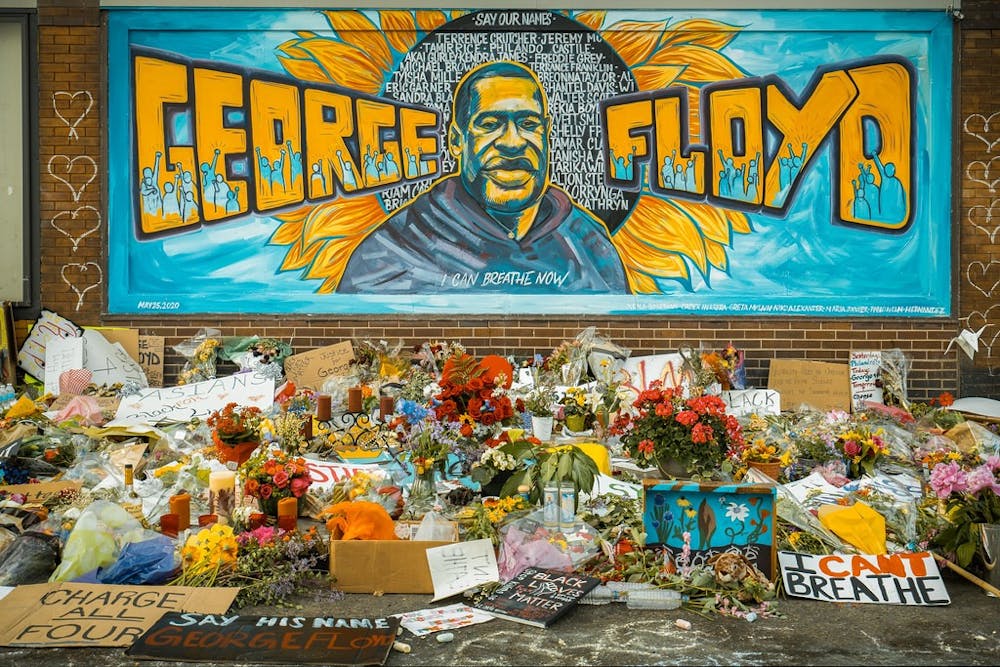Sentiments of joy and relief erupted across the country Tuesday when former Minneapolis police officer Derek Chauvin was found guilty of the murder of George Floyd.
Almost one year after a viral video circulated of Floyd’s murder — prompting protests in almost every major city across the country — the jury convicted Chauvin on all three charges brought against him: second-degree unintentional murder, third-degree murder and second-degree manslaughter.
As the verdict was read, many people across the country, and at American University, who have been fighting for racial justice in the U.S. celebrated and felt relieved, but noted that this decision should only be seen as accountability, not justice.
Freshman Leila Akinwumiju was doing homework in the School of International Service building on Tuesday afternoon when the verdict was announced.
“I was kind of shocked initially because I didn’t believe that it was going to stick. I thought it was just like a joke or something,” Akinwumiju said. “And then when I saw that it stuck, for a second I was a little happy.”
Professor Donald Collins, an adjunct professional lecturer in the history department who has written about race and African American identity, shared a similar sense of immediate satisfaction. Collins said that he initially felt “just plain relief” upon learning of the jury’s decision, as well as “a minor sense of vindication that Derek Chauvin was found to be a murderer and will conceivably spend the rest of his life in jail, in prison.”
However, this sense of relief was followed by a degree of frustration for Akinwumiju, who felt that the verdict was “just a way to placate the angry masses.”
“It wasn’t because they really cared about George Floyd,” Akinwumiju said. “I think it was because not only did they catch the entire thing on film, they knew that if they had said that he wasn’t guilty it was going to turn into a huge, multi-national protest like it did the previous summer.”
Professor Sherri Williams, an assistant professor in the School of Communication, shared this belief. Williams is currently leading a study that explores how Black millennials are affected by exposure to images of police brutality against Black people via social media. She described Chauvin’s conviction as “an iota of accountability, but … not justice.”
“It’s a relief, but it’s not justice because George Floyd is still dead,” Williams said. “His children still don’t have a father. The trauma of watching this has already been inflicted on the Black community as part of the continuum that this nation has of Black trauma.”
While Collins noticed that “some people are saying this is a historic victory” and a “game-changer” in terms of the fight for racial justice in America, he doesn’t want people to lose sight of how much work remains to be done.
“It was never zero — the total number of police officers in law enforcement who got away with killing people or got away with murder or got away with other things — meaning that at some point in time you could probably find examples of Blacks who were lynched where somebody went to jail for it back in the South. It’s just very rare … The same thing goes with police officers,” Collins said. “It’s not about getting individual people convicted and sent to prison for the rest of their lives and have them pay restitution or any of those things, it’s about systems and law enforcement is inherently racist in an inherently racist society.”
Akinwumiju said that she fears that “even well-meaning people” will interpret Chauvin’s conviction as a sign that the justice system works and that this will lead to a lapse in focus on “real policy initiatives like ending qualified immunity or dismantling police unions or things that are actual, substantial things.”
Sophomore Makenna Lindsay, who serves as student liaison for AU’s chapter of Black Girls Vote, also voiced her concerns that people will see Chauvin’s conviction as enough of a sign that the country is moving in the right direction.
“We need to keep applying pressure and keep the momentum going,” Lindsay said. “It doesn’t stop here because there are still so many people who haven’t received justice.”
Lindsay described the verdict as “honestly the bare minimum,” reminding her fellow activists that they “should not get distracted and let this be our big win.”
“It is not Black liberation, it’s not police reform, it’s not true justice for the entire community,” Lindsay said.
Collins expressed a similar idea, acknowledging that while he felt relief upon hearing the verdict, the individual conviction of Chauvin pales in comparison to the “larger scheme of things.”
“These systems are basically set up to oppress and marginalize people and until we dismantle those systems, getting a victory here and there, making inchworm progress… It’s not really gonna do anything with my life in the long term,” Collins said.
Following the verdict, President Sylvia Burwell wrote in an email to the community that the decision was a step in the right direction, but acknowledged the work that still needs to be done in the fight for racial justice.
“There is no easy solution to systemic racism or horrific violence. There is hard work, cooperation, and understanding that yields progress,” Burwell wrote in the email. “That’s what we are committed to at American University. It does not erase the pain; it does not make up for hundreds of years of hate and oppression. But it is where we have to start.”
With national media attention on Chauvin’s case as his trial played out, Lindsay hopes that the AU community can use this growing public cognizance of police brutality and institutionalized racism to maintain the energy of the movement for change.
“The awareness is there — now it is time to take action,” Lindsay said. “We need to come together and start taking action. It’s enough talk, it’s time to go, time to move. This has gone on far too long.”
kcorliss@theeagleonline.com and bjohansen@theeagleonline.com





